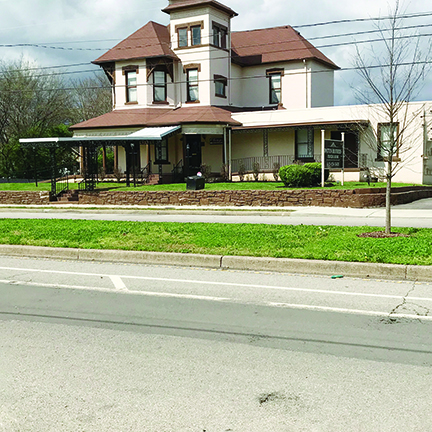By Natalie R. Bell
NASHVILLE, TN — One of the most historically significant Black funeral home buildings in Nashville has stood for approximately 100 years at 1306 South Street, in the Edgehill neighborhood.
The National Register of Historic Places recognizes African American funeral homes as expressions of entrepreneurial spirit and cultural responsibility.
During the era of legal racial segregation in the South, and for many years thereafter, Black funeral directors ran 24-hour operations caring for the living, as well as the sick and bereaved. Often their businesses were Black-owned, family-run enterprises, providing taxi, ambulance, as well as funeral services for Black families.
In the early 1920s, the Zema Hill acquired the multi-tiered, Italianate, home on South Street, establishing it as the first black-owned business in the area.
Thirty years later, in 1953, the Patton Brothers firm bought the building from Hill, and ushered in their distinctive brand of serving Black families in their most difficult time through the early twentieth-first century.
Pioneer Black Funeral Directors Popularized Polar Bears in Edgehill

“Elder Hill was known for his elegance, good looks and magnetic preaching style,” writes Mitchell. “He not only arranged funerals, he also preached and sang at the services.” Known for his elegance, good looks and magnetic preaching style, Hill also founded a church in Nashville called Hill’s Tabernacle; the congregation still meets today at 916 Carruthers Street
During the 1940s, Hill purchased four concrete polar bear statues, for $65 each, and placed two of them outside his funeral home to add what he called a “decorative touch.” He placed the other two statues at his residence on Edgehill Avenue.
But when the Pattons moved into the funeral home in 1953, they ushered in their own disctinctive, identifying characteristic.
It was Zema Hill who introduced the iconic polar bears to the Edgehill neighborhood, according to a profile, written by the late historian Reavis Mitchell, part of a series on local African American leaders.
“We didn’t think it was proper décor to have two big bears greet grieving people,” said Ed Patton, years later, in a 1980 interview with the Nashville Banner newspaper.
“Quite a few things Zema Hill did were spectacular and flamboyant,” he said. “So when someone came over and asked for them (the polar bears), we gave them away.”
Elder Hill kept the other two Polar Bears at his residence. They began to appear in other places around the Edgehill, gaining in popularity, and becoming a symbol of the neighborhood.
Patton Descendant “Fascinated” With Interior
Jonathon Patton, the youngest of four descendants of the original Patton Brothers principals, said it was his grandmother, Mrs. Alice Otey Patton, who first expressed that the Polar Bears were “inappropriate” for a funeral establishment. “She ordered them removed from the funeral home’s property,” he said.
Alice Otey Patton married Patton Brothers founder, Rev. J.T. Patton, in Franklin, TN. They later moved to Nashville. Rev. Patton had founded Patton Brothers in Franklin, 1908, the last days of horse-drawn funeral carriages. He began to expand his business to Nashville in the 1920s. When he acquired the building on South Street, the business grew to become the largest black-owned funeral directing establishment in Middle Tennessee.
There were seven locations, said Jonathon: Franklin, Nashville, Mt. Pleasant, Dickson, Fulton, KY; and two locations in Michigan, Battle Creek and Kalamazoo.
“I’ve always been fascinated with the historic character of the home that was made into a funeral home,” said, Jonathon of the building on South Street. His father, Edward, was the youngest son of the founder. When Edward and wife Mary Kathryn Jones first married, they were required to live in the upstairs apartment.
The family business was run with a strict code of conventionality, said Jonathan. You did what you were asked to do.
The business offices were located downstairs in the basement area. “There was an antique commode with a pull chain that you had to pull to flush. “That was always an allure, an attraction for me.”



